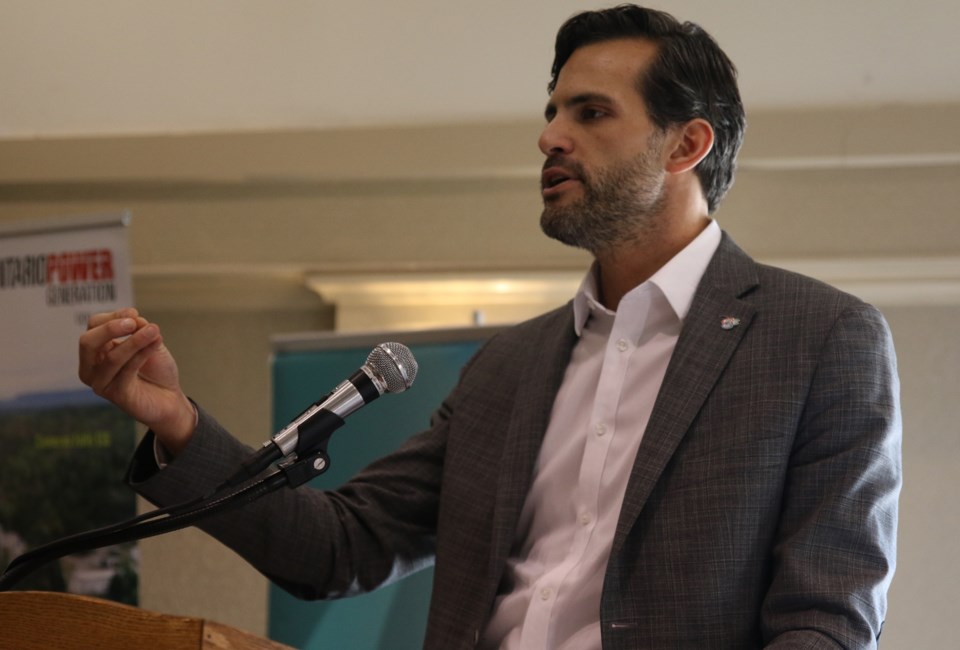THUNDER BAY -- Most businesses province-wide have faith in their own future success but when it comes to the broader economy, corporate Ontario is losing its religion.
The 2017 Ontario Economic Report shows 62 per cent of the Ontario Chamber of Commerce's surveyed members were confident in their own organization's economic outlook but only 24 per cent are confident in Ontario's economy.
Small businesses expressed the least confidence at 61 per cent while 72 per cent of medium and large businesses held an optimistic outlook. Less than half of small businesses (41 per cent) expected their organization's revenue to increase over the next year.
"OCC members are unsure of the stability of the wider provincial economy and critical of the impact government policy will have on their organization," the report reads.
OCC vice president of policy and government relations Karl Baldauf dissected the report's findings with Thunder Bay Chamber of Commerce members at a luncheon on Friday.
Baldauf expressed business' poor confidence in the economy through the OCC's new business prosperity index, an indicator showing the costs companies are applying to resources needed to conduct their business, expressed as a percentage of their total resources.
The study found the average rate to be 48.5 per cent, meaning nearly half of available capital isn't being directly re-invested.
"What we're seeing is although there is this available capital, businesses are holding onto their money. They're not investing in new hires, they're not investing it back into their communities," Baldauf said.
"There is tremendous available capital and businesses are holding onto it. In our conversations with government, we need to speak frankly about the notion of instilling more confidence into the market."
Traditional provincial prosperity measurements are at a 15 year high, Baludauf expressed, but he attributed that prosperity to illusions of market speculation.
Prosperity resulting from the production of goods and services fell 24 per cent between 2013 and 2015 while prosperity from non-production activity increased 85 per cent.
"There's a bit of deception in our understanding of this prosperity because a lot of it is coming from the moving of money around within financial institutions and not actually creating new things," he said. "All of this is a cause for concern."
Northwestern Ontario in general and Thunder Bay in specific have not effectively rebounded from the 2009 recession, he argued, as he warned the city's labour force numbers fell over 2016 in both employment and unemployment.
The region's traditional resource extractive industries are beholden to international market forces, meaning the strongest chance for economic recovery would be a swing in the value of precious metals.
"While Thunder Bay is a metro area providing services to the outlying region and is a major regional port, it's still fairly dependent on resource extraction and processing in forestry and mining, occurring in the rest of the Northwest region," he said.
"What we need to see is a stronger mining sector, which is possible. As we all know, lumber faces a problematic future with duties imposed by the US -- a mere reality."
Thunder Bay Economic Development Corporation CEO Doug Murray suggested the employment decline and risk aversion is occurring, in large part, as a result of baby boomer small business owners taking fewer risks at the tail end of their careers.
"We also have an aging fleet," he said. "The people who own our small businesses are getting older. We need to look at changing the ownership of that work. I think there are opportunities in people being 40 years old owning a business versus somebody who's 70 years old and owning a business, who is very cautious. If they turn that over to a 40-year-old, he'll take a little more risk."
Lakehead University economics professor Livio Di Matteo agreed the regional economy is flatlining but he echoed Baludauf's concern over the precarious state of Ontario's economy. He speculated business is holding back its investment
"If you look at Ontario, you'd think business confidence might be about to improve because the budget is about to be balanced," Di Matteo said.
"We're still sitting on $300 billion of debt. Even though the budget is going to be balanced, the province is still funding infrastructure through debt, Revenues are up but part of the revenues are increased federal transfer payments since 2009. Those are about to decline.
Interest rates across the country are going up and as soon as the budget is balanced -- you will have already noticed news items -- there's a whole list of individuals with all kinds of interesting ideas on how to spend a surplus that's not really there."
